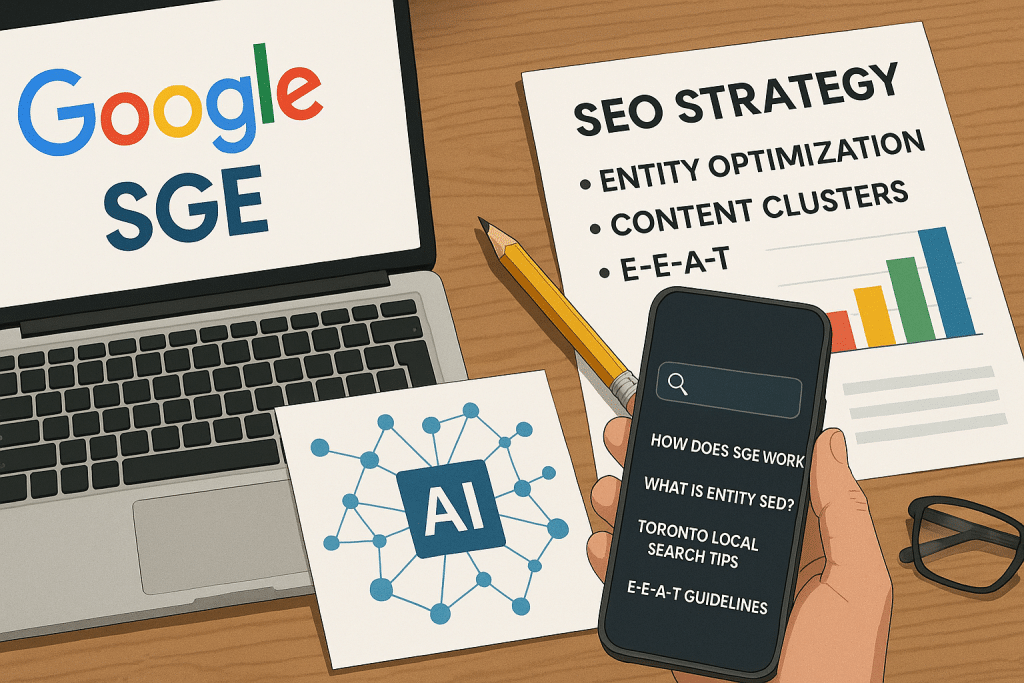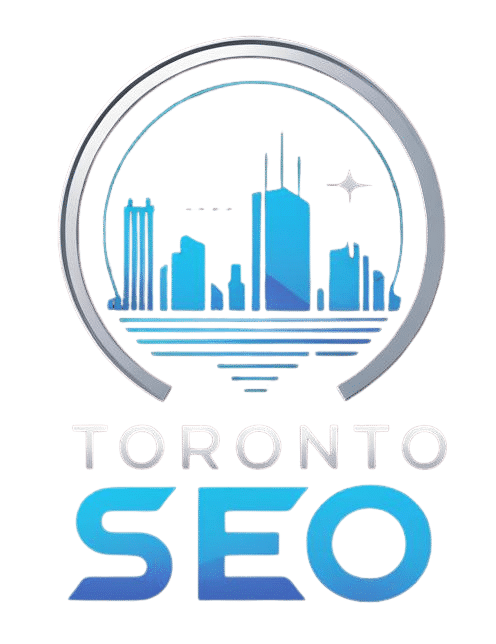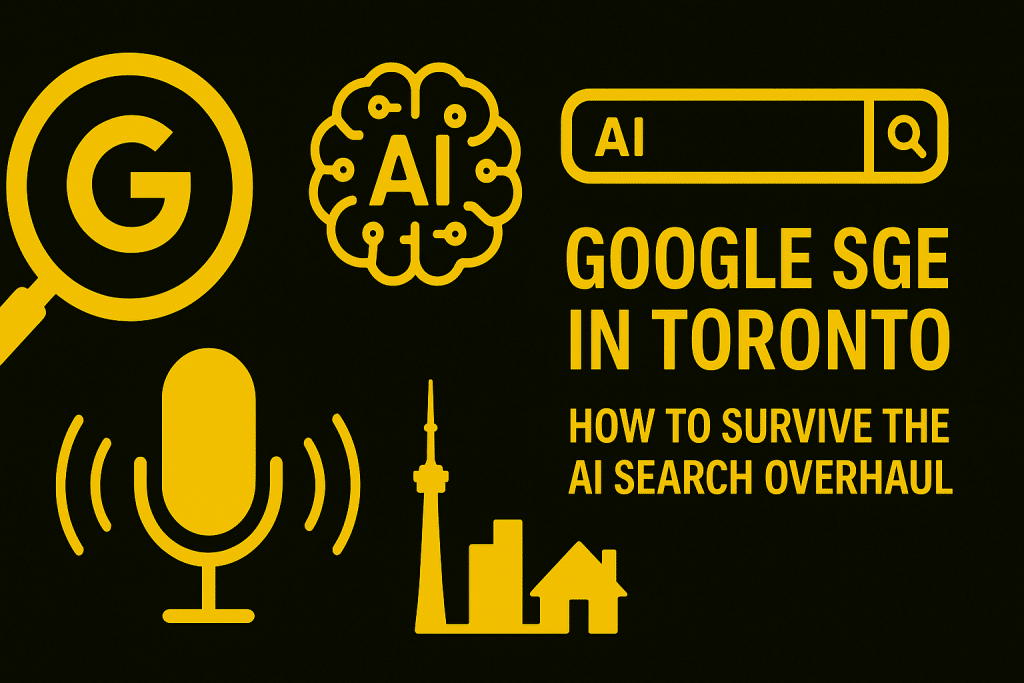The rise of Google’s Search Generative Experience (SGE) represents one of the most significant shifts in the search landscape since the introduction of featured snippets. For Toronto businesses and SEO professionals, this isn’t a minor algorithm tweak — it’s a complete transformation of how users discover information and how brands are presented in the SERPs. Adapting to SGE isn’t optional; it’s a survival strategy.
In this comprehensive guide, we’ll explore how Toronto brands can navigate, adapt, and thrive in an SGE-dominated search environment through smart content structuring, entity optimization, brand positioning, and AI-aligned SEO strategies.
Understanding Google SGE: What Toronto Businesses Must Know
Google SGE uses generative AI to produce contextual summaries at the top of search results, often answering user queries directly. This means traditional organic listings are pushed further down, and traffic patterns are shifting. For local Toronto businesses relying on search visibility, the implications are enormous.
Unlike standard snippets, SGE dynamically pulls from multiple authoritative sources, rewriting information in a conversational format. To be part of this AI snapshot, your content needs to be structured in a way that signals authority, relevance, and semantic depth.
For a deeper understanding of how SGE integrates with ranking factors, it’s crucial to review Google’s official guidance on generative AI search — this is no longer about simple keyword placement; it’s about entity relationships, first-party data, and trusted sources.
How SGE Changes SEO Game Plans in Toronto
1. Traditional Click-Through Rates Are Declining
With AI summaries answering queries above the fold, clicks are consolidating to fewer, more authoritative domains. This impacts every Toronto business that previously depended on ranking in positions 3–10.
For example, a Toronto law firm SEO strategy that relied on ranking for “divorce lawyer Toronto” now faces reduced visibility even if it ranks #2. The AI snapshot might only reference one authoritative local law firm and two national legal resources.
2. Entity Optimization Matters More Than Ever
SGE relies heavily on Knowledge Graph and entity recognition. Businesses with well-structured schema, consistent brand mentions, and authoritative content clusters are more likely to appear in AI summaries. A well-executed Toronto SEO audit checklist is now critical to ensure your site is machine-readable and entity-complete.
3. First-Party Expertise Is Prioritized
Google’s AI models look for original insights, case studies, and expert commentary. Thin or generic content has virtually no chance of surfacing. Toronto agencies that historically scaled content through keyword volume now need to emphasize depth over breadth.

Adapting Your Toronto SEO Strategy for Google SGE
Prioritize Topical Authority Through Content Silos
Building thematic content clusters around high-value topics is essential. Instead of writing isolated blog posts, Toronto businesses should interlink related articles that reinforce their topical expertise. For example, a local agency might build an AI SEO cluster using resources like:
This internal linking structure helps Google’s AI understand the semantic relationships between pages, boosting the likelihood of SGE inclusion.
Implement Advanced Structured Data
Schema markup isn’t new, but its importance has skyrocketed. Implementing Organization, LocalBusiness, Service, and FAQ schema helps Google contextualize your entity. Toronto companies should also add Speakable schema to improve voice search compatibility — another key area where SGE is expanding.
Well-structured schema enables your content to feed Google’s generative models, increasing the chance that your brand is referenced in the AI snapshot.
Invest in High-Authority Backlinks with Brand Anchors
While traditional backlinking strategies still matter, brand-focused backlinks from reputable sites have greater weight in entity recognition. Appearing in editorial mentions, press releases, and industry lists can elevate your brand’s authority.
Toronto agencies are increasingly focusing on non-guest-posting strategies, like those outlined in this advanced backlinking guide.
Optimize for Conversational Queries and Long-Tail Questions
SGE surfaces natural language queries, not just head terms. Instead of optimizing only for “SEO Toronto,” businesses should target queries like:
“How does SGE affect local Toronto SEO?”
“Best AI SEO strategies for service businesses in Toronto”
“Is traditional SEO still relevant with SGE?”
Incorporating Q&A sections, FAQ blocks, and subheadings that mirror user queries makes content more likely to be referenced in AI-generated answers.
Building Trust Signals for Google’s AI Models
Demonstrate E-E-A-T Through Author Pages and Reviews
Google’s generative models heavily weigh Experience, Expertise, Authoritativeness, and Trust (E-E-A-T). This means author bios, company credentials, and third-party trust signals matter more than ever.
Toronto brands should ensure their site features:
Detailed author bios with credentials
Third-party review widgets (e.g., Google Business Profile reviews)
Updated About and Contact pages that match NAP (Name, Address, Phone) across platforms
For reference, see Google’s quality rater guidelines which directly influence SGE’s trust weighting.
Leverage Local SEO for SGE Visibility
SGE’s local results still pull from Google Business Profile and citation data. Ensuring consistent local citations and optimized GBP listings remains essential. Learn why citation building still matters for Toronto local rankings in 2025 to maintain visibility in AI-enhanced local packs.
Case Study: Toronto Agencies Pivoting for SGE
Top Toronto SEO agencies are already adjusting their strategies to accommodate SGE. Many are:
Combining SEO with prompt engineering to structure content in ways that AI prefers (why prompt engineering is the secret weapon for Toronto SEO firms).
Developing AI content briefs to ensure topic coverage is exhaustive and well-structured.
Aligning technical SEO, entity optimization, and content strategy under one cohesive framework.
These agencies are moving away from chasing keywords individually and are instead building entities and content ecosystems that feed AI confidently.
Key Action Plan for Toronto Businesses
To stay visible in Google SGE, Toronto businesses should:
Audit and enrich structured data with LocalBusiness, Organization, and FAQ schema.
Develop topic clusters around key verticals with smart internal linking.
Invest in brand-focused link building from authoritative sites.
Write for conversational search and long-tail intent.
Demonstrate strong E-E-A-T signals with expert authorship and third-party trust.
Monitor SGE results manually and with AI tracking tools to understand positioning changes.
These are not one-time actions. They form the foundation of a resilient SEO strategy that can weather AI disruptions.
Final Thoughts: SGE Isn’t the End — It’s the Evolution
Toronto brands that embrace SGE’s structural changes are positioning themselves for dominance in the next era of search. This isn’t about fighting AI — it’s about collaborating with it through structured, authoritative, and deeply relevant content.
If your current SEO strategy doesn’t account for entity optimization, content silos, or SGE alignment, now is the time to evolve. For tailored strategies, contact our Toronto SEO experts to ensure your business thrives in this AI-driven search landscape.


